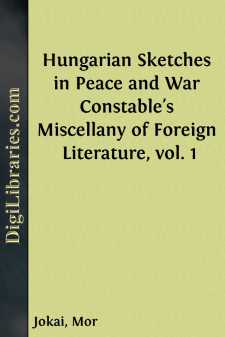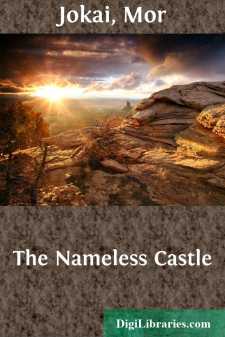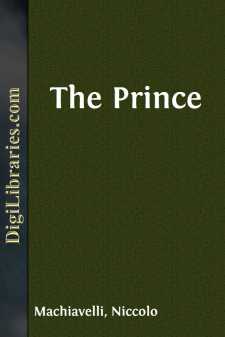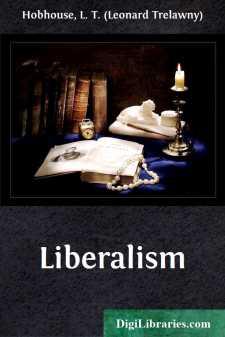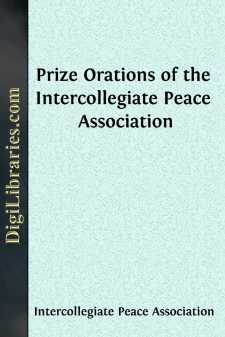Categories
- Antiques & Collectibles 13
- Architecture 36
- Art 48
- Bibles 22
- Biography & Autobiography 813
- Body, Mind & Spirit 142
- Business & Economics 28
- Children's Books 17
- Children's Fiction 14
- Computers 4
- Cooking 94
- Crafts & Hobbies 4
- Drama 346
- Education 46
- Family & Relationships 57
- Fiction 11829
- Games 19
- Gardening 17
- Health & Fitness 34
- History 1377
- House & Home 1
- Humor 147
- Juvenile Fiction 1873
- Juvenile Nonfiction 202
- Language Arts & Disciplines 88
- Law 16
- Literary Collections 686
- Literary Criticism 179
- Mathematics 13
- Medical 41
- Music 40
- Nature 179
- Non-Classifiable 1768
- Performing Arts 7
- Periodicals 1453
- Philosophy 64
- Photography 2
- Poetry 896
- Political Science 203
- Psychology 42
- Reference 154
- Religion 513
- Science 126
- Self-Help 84
- Social Science 81
- Sports & Recreation 34
- Study Aids 3
- Technology & Engineering 59
- Transportation 23
- Travel 463
- True Crime 29
Hungarian Sketches in Peace and War Constable's Miscellany of Foreign Literature, vol. 1
by: Mor Jokai
Description:
Excerpt
PREFACE.
Jokai is one of the most popular of the Hungarian prose writers of fiction that sprang up a few years before the late war. His wit, flowing style, and vivid descriptions of Hungarian life as it is, joined to a rich fancy and great intensity of feeling, soon made him a favourite with Hungarian readers.
Among the earlier of his productions, those best known are a novel entitled, "The Common Days," and a collection of minor tales, published under the title of "Wild Flowers."
The present volume has been written for the most part since the late memorable national movement, and embodies descriptions of several of the direst scenes in the civil war which devastated Hungary from the year 1848 to 1850.
Most of the Hungarian literati were, at the close of the war, either roaming in foreign countries, or wandering in disguise through their native land; and the field of literature for a long time threatened to remain neglected and barren—a monument of national grief and desolation! Those patriotic writers who had for years wielded the pen with the noblest impulses thought to do their duty best by letting their highest faculties lie dormant; and laid aside the lyre rather than bring unacceptable offerings to a fatherland laid low, and at the mercy of foreign swords. And who will deny that there is sometimes great virtue in silence, and that the tongue that speaks not is often more eloquent and heroic than that which dares to utter sublime truths even at the foot of the gibbet? Many of the noble-hearted of Hungary resigned themselves to such a martyr-like silence, and persevere in it to the present day; while the great bulk of the people, unwilling to enhance the triumph of their victorious enemies by a show of unavailing lamentation, followed their example. Pesth, which had been the scene of literary activity, was at once deserted; the bards of Hungary, abandoning their homes to the wantonness of a foreign soldiery, went back to the districts whence they had come, there to mingle with those peasants whose chivalry and patriotism afforded constant themes to their lyres. Their renewed intercourse with their rustic countrymen served again to revive their hopes, quenched as in the grave.
In the sketches of Jokai, the reader will find many original delineations of Hungarian life among the middle-class nobility—a race of men whose manner of life and thought cannot fail to be interesting, however cursorily described. But the Hungarian peasant is in his way no less attractive. Nothing can be wilder than his dress, consisting of a sheepskin cloak (bunda), or a similar habit of the coarsest cloth, a shirt, scarcely reaching below the waist, and wide linen drawers, to which boots do not often form the necessary complement; yet his easy demeanour, delicate feelings, and especially his language, are such as to put him on a level with the educated classes. In conversation he will often use a more dignified style than a noble, who, by his exclusive privileges, has had ample scope for oratory in the county assemblies—select with astonishing tact the best lyrical productions of the day, and immortalize the lay by a tune of his own composition. These qualities of the Hungarian rustic—an insight into whose character will be given to the reader by a few camp scenes contained in this volume—must appear the more striking if we remember that the class to which he belongs was for centuries in a state of serfdom, from which it was only liberated by the late Revolution.
Independently of the various other calamities which prevented the development of the physical and mental resources of Hungary during the last three hundred years, the feudal system alone was an insurmountable barrier in the way of progress. The privileged classes were for the most part devising how to kill the time, while the labour of the peasant provided them with the means of gratifying their propensities, rarely disquieted by the backward state of the country, which in their eyes seemed all perfection. Properly speaking, it was only since the year 1825 that matters had begun to exhibit a material change in this respect. Many of the most conceited and thoughtless among the nobles had gradually allowed themselves to be convinced that arts and sciences might add to the charms of an easy life; and that national greatness demanded something more than hospitable roofs, fertile plains, and vast herds of cattle....


